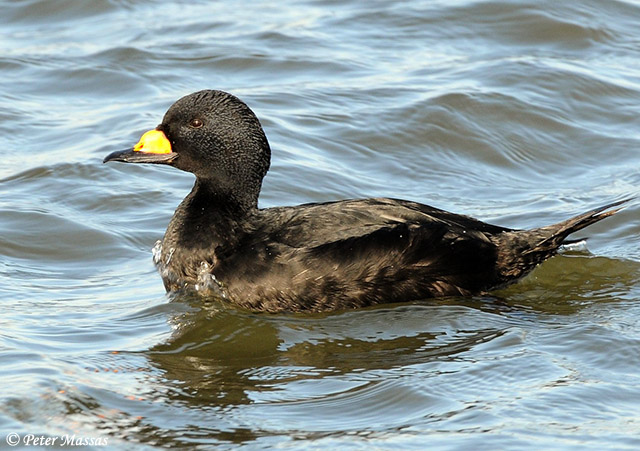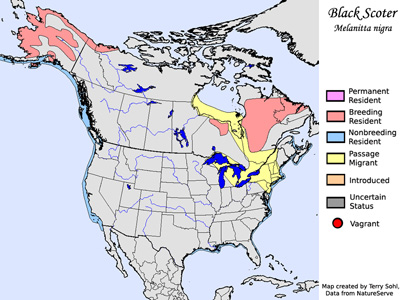| Length: 17 to 21 inches | Wingspan: 30 to 36 inches | Seasonality: Migrant |
| ID Keys: All black body, head and bill except for orange knob on top of bill (male) | ||
 The Black Scoter is generally the least common of the three
Scoter species found in North America, despite their former name of "Common
Scoter". They are more vocal than the other Scoter species, and have
a very musical call for a duck. They are only rare migrants in South
Dakota.
The Black Scoter is generally the least common of the three
Scoter species found in North America, despite their former name of "Common
Scoter". They are more vocal than the other Scoter species, and have
a very musical call for a duck. They are only rare migrants in South
Dakota.
Habitat: In summer, they breed on lakes in boreal forests of Canada and Alaska, as well as wet tundra. Winter habitat is primarily along coastal waters, primarily within a mile or two of shore. A few may over-winter on the Great Lakes or other large inland water bodies.
Diet: Primarily feeds on mollusks when at sea, but also crustaceans, marine worms, and small fish. During summer breeding season, feeds heavily on aquatic insects as well as small fish, mollusks and crustaceans, and aquatic plants.
Behavior: Diving ducks, feeding by diving below the water's surface and propelling themselves with their feet in search of food.
Interactive eBird Map: Click to access an interactive map of Black Scoter sightings
Song: Often silent, but the male has a very musical coor-loo call. The male also whistles during courtship.
Migration: Summers locally in eastern Canada and in Alaska. Winters along both the Atlantic and Pacific coasts of North America. They are relatively rare migrants in South Dakota.
Similar Species: Surf Scoter, White-winged Scoter
Conservation Status: Numbers have declined from historical levels, although they appear to be generally stable at present.
Further Information: 1) USGS Patuxent Bird Identification InfoCenter, Black Scoter
3) Audubon Guide - Black Scoter
Photo Information:
January 27th, 2010 -- New Jersey -- Peter Massas
| Click on the range map for a higher-resolution view |
 |
| South Dakota Status: Accidental migrant in the state. |
Additional Black Scoter Photos (coming soon!)
